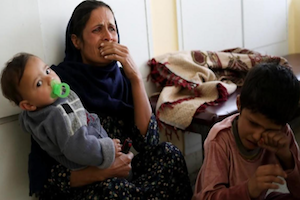
The United Nations World Food Program and other international aid agencies, have issued warnings of widespread famine in Afghanistan that could kill tens of thousands in this impoverished country in coming months. According to the World Health Organization, an estimated 3.2 million Afghan children are expected to suffer from acute malnutrition by the end of this year, with 1 million of them at risk of dying as temperatures drop this winter.
The crisis in Afghanistan’s cities is a direct result of international economic sanctions against the Taliban regime that took over the country in August, as well as the flight of donor agencies. When the Taliban took control of the country, foreign aid accounted for three-quarters of government spending and the country was dependent on regular physical shipments of U.S. dollars to fund its trade deficit. After Kabul fell to the Taliban, The U.S. cancelled all dollar shipments and froze $9.5 billion of Afghanistan’s central bank assets, European banks quickly followed suit. Without financial aid the government has been unable to pay teachers and other public employees. A lack of foreign currency has also made it all but impossible for Afghanistan to import critical food and medical supplies.
Between The Lines’ Scott Harris spoke with Kathy Kelly, lifelong nonviolence activist and co-coordinator of the Ban Killer Drones campaign, who talks about the dire situation in Afghanistan where millions of civilians now face starvation, an economic collapse, drought — and after four decades of war, what may be the worst humanitarian crisis in the world.
KATHY KELLY: Twenty-four million people are facing acute hunger, and that’s an extreme form of starvation. Mr. Beazley, who heads the World Food Program, has called it the worst humanitarian crisis on Earth. And the World Food Program, about a month after the fall of Kabul, assessed that only one in 20 Afghan households had enough to eat. And right now, 47 percent of the Afghans are at crisis or emergency levels of food insecurity, and the projection is that that will rise to 55 percent.
So the harsh winter weather is coming. People, many people fear that if they’re that poor, they can’t possibly afford would to, you know, put logs inside as they call it a bukhari, a little stove. And I know many people had only heavy blankets to help them get through the harsh winter, but people can’t always even afford that, much less warm clothing. And the health care system was already near collapse. And right now, because of the frozen assets, health care workers and teachers aren’t being paid. You know, the United States has frozen $10 billion in Afghanistan’s assets and $449 million in International Monetary Fund emergency reserves.
And I think that’s cruel because the people who will be hit by that and, you know, maybe lethally hit are women and children, 75 percent of Afghanistan’s population. I think the Taliban, they certainly weren’t planning on this. It’s disastrous for them.
But they can make money from charging taxes on every vehicle that crosses any border of Afghanistan. They can make money on the poppy crop. And so I don’t think this is really going to hit the Taliban so badly.
But the women and girls are at particular risk. I mean, if a woman heads a household and there’s no other income earner and she’s lost her job and she doesn’t have access to cash or any other assistance, as many single women don’t, what what is she to do?
Fortunately, some U.N. agencies are starting to use the hawala means of moving money. It’s illegal in the United States to use it, but for instance, Australia can use it, and they’re trying to set up an escrow account and get some money into the households of teachers and health care workers in the form of paychecks.
But, you know, some say so this is going to be going back to the ’90s, right? Well, no, it’s a whole lot worse because things were bad in the ’90s. But now Afghanistan has a much bigger population and the neighboring countries, along with Europe, are much more resistant to migrants coming across their borders.
SCOTT HARRIS: What is the U.S. government policy vis-a-vis the funds that have been frozen? I imagine that the U.S. government rationale for this is that when the Taliban ruled Afghanistan in the past before the war began in 2001, they conducted themselves in a very abusive and brutal way, especially towards women. There are a lot of policies that the Taliban employed when they ran the country that violated human rights up and down the roster. Tell us a little bit about what you think U.S. policy should be when it comes to these funds. How how can these funds be released and not overtly support what the Taliban represent?
KATHY KELLY: Well, I think it’s good news that there are still, I believe, 38 United Nations agencies working in Afghanistan. And I mean, I can understand that the Taliban are on the terrorist list. And once you’re designated as a foreign terrorist organization, it takes a long time for that designation to be lifted. But sometimes the U.S. can move a lot faster. And it’s my hope that that’s what they’ll do in this instance, because it’s just not fair for one of the richest countries in the world to be sitting on $10 billion of Afghanistan’s assets. Well, Afghans are nearing famine. It’s just not right. So I think it’s good that the U.N. set up this escrow account, and I hope people will really press the government of the United States to push money in that direction and try to get money as quickly as possible to the neediest people.
But I think all of the countries that were ever involved in invading and occupying Afghanistan should get together, acknowledge their wrongful behavior, their cruel behavior, and then pay reparations in the form of helping that country get back on its feet and make reparations in the form of dismantling our own military systems.
For more information, visit the Ban Killer Drones Campaign at bankillerdrones.org.




